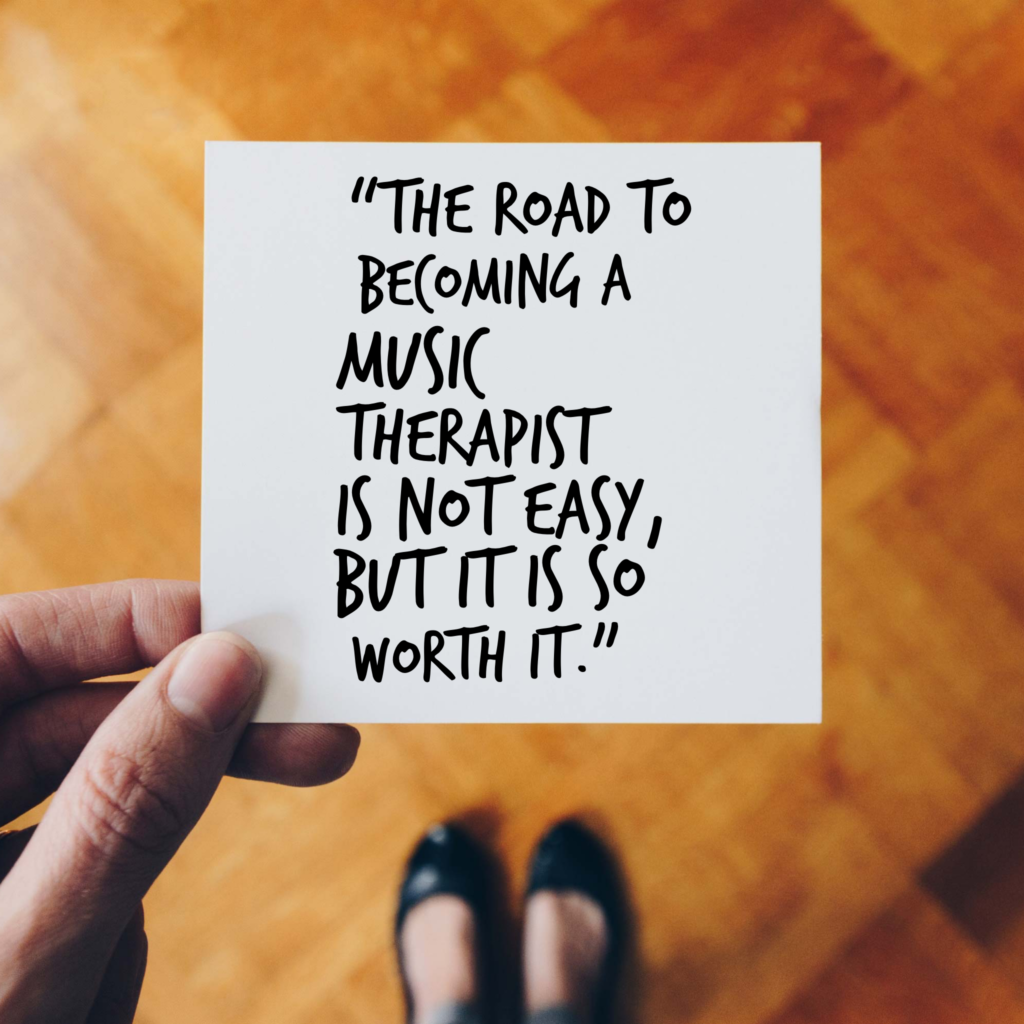Kenzi Podell, a music therapist, is fresh off of passing her board exam to become a licensed music therapist. She learned a lot through the process of becoming a music therapist, and she wanted to share that hard-earned knowledge with others who are coming behind her in the process. Whether you’re just getting started on your own journey to becoming a music therapist, you know someone else who is, or you’re just curious as to what music therapists have to complete in order to practice music therapy, this blog series, “The Journey of a Music Therapist” should be helpful.
Just tuning in? Be sure and read the previous post: Internship 101
To actually practice music therapy, there are so many requirements. Not only does a music therapist have to receive a Bachelor’s degree in Music Therapy while getting a minimum of 1200+ clinical hours, but the music therapist is also required to complete a six-month internship (typically unpaid), and finally, pass a 150-question expensive board certification exam. Some states even require licensure, which is a whole other process. While we practice music therapy, we also must receive continuing education credits in order to keep our certification. The road to becoming a music therapist is not easy, but it is so worth it.
When it comes to the aforementioned 150-question expensive board certification exam, can I be blunt? It is hard, and it stinks to take it and to study for it. That is why I am here! I have so many tips and resources that I am about to share with you to help you ace the exam. (Note: I have so much to share that this post will be a two-parter, so come back next week for the second half!)
First, let me put it out there that this test is no joke. I have always been a “straight-A student, could ace a test I didn’t even study for,” kind of person. It took me four tries to pass this test. I know other incredible therapists that took it just as many, if not more, times. When people say it is hard, they mean it; however, the way you mentally and physically prepare for it will help you succeed.
Not sure how to even apply for the exam? Register here. It costs roughly $300 the first time you take it, so get your wallet prepared. Now for my tips on what to study:
1. Buy practice exam B (or both if you can afford it).
I bought both, and I personally found form B to be the most helpful. Take the test in a similar environment as test day. Lock yourself in a room, leave your phone elsewhere, have a piece of paper and a pencil, and take the practice test. You have three hours to take the test, with several five-minute breaks for water/bathroom. Make it feel like you are taking the actual test.
2. Review practice exam B.
Don’t just read the question and the right answer. Take the time to write out why you put the answer you did, why it was wrong, and why the right answer is right. You may realize that certain words in the question lead to the right answer (hint hint), and you just misread it.

3. Read Hanser’s The New Music Therapist’s Handbook.
Highlight areas you do not know. Fold the corner of any page that has a highlighted spot. This makes is so much easier to go back and study. Each chapter has key terms at the very end. Use those to learn! I read a chapter a day for three weeks prior to the exam. After each chapter, I wrote down a basic summary and specific notes I learned. This helps you narrow your studying down.
4. Quizlet is your best friend.
If you don’t know what Quizlet is, you’re about to have your mind blown. It is an easy and free app/website you can use to study! Plug in all of those terms from the handbook that you don’t know and study away. There are games to help you learn, as well as other Quizlet sets pre-made from other people studying for the CBMT! Just Google CBMT Quizlet and you will find plenty.
5. Find a study buddy.
There is a Facebook group full of people who are studying for their exams (MT-BC Study Group). You can easily find a study buddy there, or ask your schoolmates! Studying with a group holds you accountable for actually studying. Just make sure you are staying on task!
6. Study these other important materials.
Introduction to Approaches in Music Therapy by Alice-Ann Darrow
7. Study the Board Certification Domains.
The Board literally has these posted on their website. It is a list of what they are testing you on. Check off areas as you study!
8. Make a study sheet.
Write out a “cheat sheet” of things you want to remember for the test. I wrote down material such as: a short definition for each approach, the guitar strings, circle of 5ths, certain key words I didn’t want to have to remember, and also a transposition cheat chart. I literally wrote out this sheet every night the week of the test, so when I got into the test, I could write it all super fast on the piece of paper they gave me!
You’ve studied hard, and your test is coming up! What now? Come back next week for part two of “Passing the CBMT exam.”

Hi, just took the test and didn’t pass, however I’m wondering if my bookmarked answers didn’t register. if they did… them in interested in how to pass this test. I graduated years ago, but really want to pass this exam. when is your second video coming out!?